|
|
| Sei in: Cinema e Medioevo « Indice alfabetico dei film |
I SETTE SAMURAI
(Shichinin no samurai)
1954, regia di Akira Kurosawa
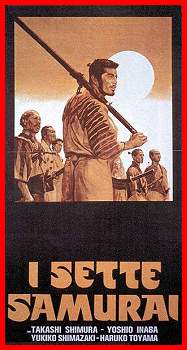
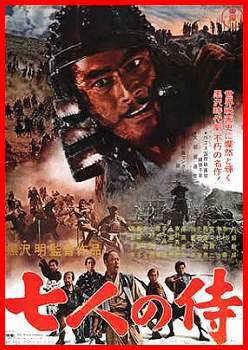
Scheda: Nazione: Giappone - Produzione: Toho - Distribuzione: Dear-Toho, Vivivideo, San Paolo Audiovisivi, L'UnitÓ Video, Columbia Pictures, Criterion Pictures Corp. - Sceneggiatura: Shinobu Hashimoto, Akira Kurosawa, Hideo Oguni - Fotografia: Asakazu Nakai - Montaggio: Akira Kurosawa - Scenografia: K˘hei Ezaki, Seiton Maeda, So Matsuyama - Costumi: K˘hei Ezaki - Musiche: Fumio Hayasaka - Formato: B.N. - Durata: 208' (155', 140').
Cast: Takashi Shimura, Toshir˘ Mifune, Yoshio Inaba, Seiji Miyaguchi, Minoru Chiaki, Daisuke Kat˘, Isao Kimura, Kamatari Fujiwara, Kokuten Kodo, Bokuzen Hidari, Yoshio Kosugi, Yoshio Tsuchiya, Keiji Sakakida, Jiro Kumagai, Haruko Toyama.
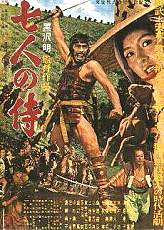
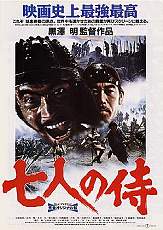
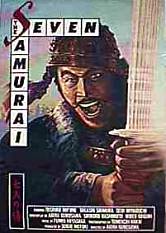
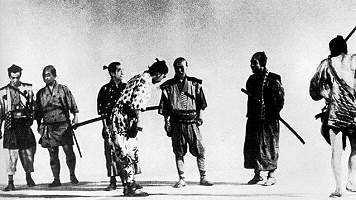
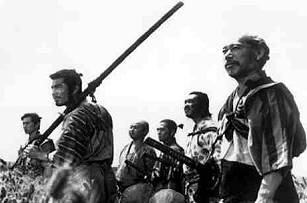
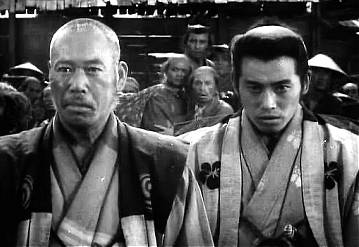
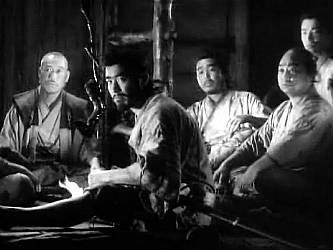
![]() Trama e commenti: cinematografo.it
- kataweb.it
-
mymovies.it
- cinekolossal.com
- it.wikipedia.org
- film.spettacolo.virgilio.it: źNel Giappone del Cinquecento alcuni contadini, per difendersi dai briganti che razziano il paese lacerato dalle guerre civili, investono i loro umili risparmi per assoldare sette samurai che difendano le loro terre. Soldati e contadini, uniti nella lotta, andranno al di lÓ delle differenze di ceto per trovare un ideale comune. Quattro samurai e molti contadini moriranno in battaglia. Kurosawa, autore anche della sceneggiatura insieme a Shinobu Hashimoto e Hideo Oguni, dopo
Rash˘mon firma un altro capolavoro, dove i temi a lui cari trovano un'espressione epica e insieme pacata: lo scontro tra due culture, il sogno collettivo della solidarietÓ, la morale del combattimento e la speranza umanitaristica in un mondo migliore. Rifatto a Hollywood in forma western
I magnifici sette e come film di fantascienza
I magnifici sette dello spazio╗.
Trama e commenti: cinematografo.it
- kataweb.it
-
mymovies.it
- cinekolossal.com
- it.wikipedia.org
- film.spettacolo.virgilio.it: źNel Giappone del Cinquecento alcuni contadini, per difendersi dai briganti che razziano il paese lacerato dalle guerre civili, investono i loro umili risparmi per assoldare sette samurai che difendano le loro terre. Soldati e contadini, uniti nella lotta, andranno al di lÓ delle differenze di ceto per trovare un ideale comune. Quattro samurai e molti contadini moriranno in battaglia. Kurosawa, autore anche della sceneggiatura insieme a Shinobu Hashimoto e Hideo Oguni, dopo
Rash˘mon firma un altro capolavoro, dove i temi a lui cari trovano un'espressione epica e insieme pacata: lo scontro tra due culture, il sogno collettivo della solidarietÓ, la morale del combattimento e la speranza umanitaristica in un mondo migliore. Rifatto a Hollywood in forma western
I magnifici sette e come film di fantascienza
I magnifici sette dello spazio╗.
![]() Plot Summary, Synopsis, Review: IMDb - encyclopedia.thefreedictionary.com
- cinematek
- entertainment.msn.com
- cine-passion.site.voila.fr
- searchportal.information.com
- tvguide.com: źMuch imitated, still unsurpassed. By critical consensus one of the best movies ever
made, The Seven Samurai covers so much emotional, historical, and cinematic ground that that it demands to be viewed over and over again. Director Akira Kurosawa re-imagines the epic westerns of John Ford in a Japanese context, yielding an art-house action picture with cross-cultural appeal.
The film is set in the 1600s during the Sengoku era, when the once-powerful samurai were coming to the end of their rule. A small, unprotected village, which is regularly pillaged by murderous thieves, comes under the protection of a band of these samurai. Kambei (Takashi Shimura) is a veteran warrior who has fallen on hard times and who answers the villagers' appeal for help by gathering six comrades to help defend the town. (Each of the samurai is quickly limned to show us who they are, what they do, and whatever personal quirks they may have.) In return for three small meals daily, the men drill the town on how to fight, but the parties are battling for different reasons. The townspeople are desperate to keep their lives and property intact; the warriors are in it for honor alone. The last of the samurai to join is Kikuchiyo (Toshiro Mifune), a loudmouth who pretends that he is qualified but who is, in reality, a farmer's son who hopes to be accepted by the others. The 40 bandits arrive, and...╗.
Plot Summary, Synopsis, Review: IMDb - encyclopedia.thefreedictionary.com
- cinematek
- entertainment.msn.com
- cine-passion.site.voila.fr
- searchportal.information.com
- tvguide.com: źMuch imitated, still unsurpassed. By critical consensus one of the best movies ever
made, The Seven Samurai covers so much emotional, historical, and cinematic ground that that it demands to be viewed over and over again. Director Akira Kurosawa re-imagines the epic westerns of John Ford in a Japanese context, yielding an art-house action picture with cross-cultural appeal.
The film is set in the 1600s during the Sengoku era, when the once-powerful samurai were coming to the end of their rule. A small, unprotected village, which is regularly pillaged by murderous thieves, comes under the protection of a band of these samurai. Kambei (Takashi Shimura) is a veteran warrior who has fallen on hard times and who answers the villagers' appeal for help by gathering six comrades to help defend the town. (Each of the samurai is quickly limned to show us who they are, what they do, and whatever personal quirks they may have.) In return for three small meals daily, the men drill the town on how to fight, but the parties are battling for different reasons. The townspeople are desperate to keep their lives and property intact; the warriors are in it for honor alone. The last of the samurai to join is Kikuchiyo (Toshiro Mifune), a loudmouth who pretends that he is qualified but who is, in reality, a farmer's son who hopes to be accepted by the others. The 40 bandits arrive, and...╗.
![]() Approfondimenti: Movie
Review
Approfondimenti: Movie
Review
Conosciuto anche con i titoli:
The Magnificent Seven; Seven Samurai.